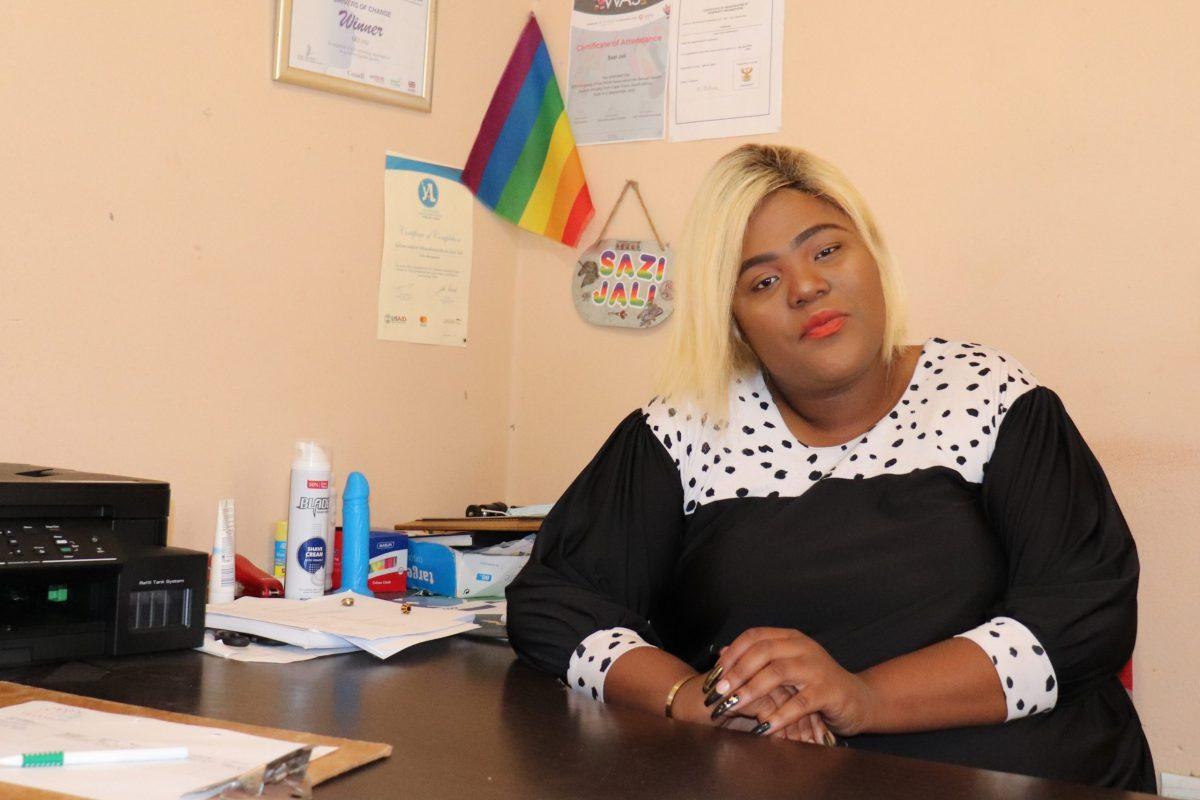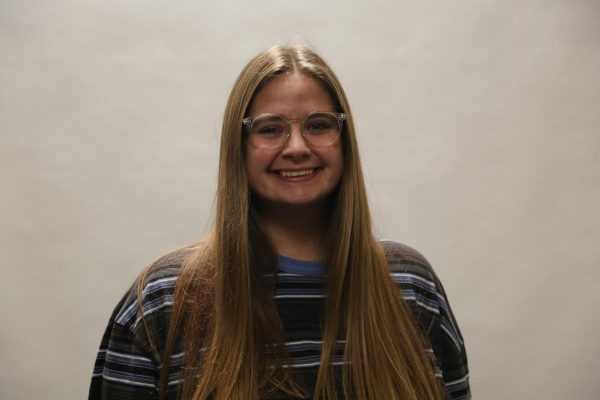Umlazi, South Africa – The blue house behind the gate at the top of a steep driveway in the middle of Umlazi is a beacon of hope amid the troubles that surround it in the Black township of Umlazi, now a suburb of Durban.
The fourth largest township in South Africa, Umlazi was created by the apartheid government under the Group Areas Act of 1950 when Black and brown South Africans were forcibly removed from areas reserved for white South Africans.
At the top of the driveway wave two identical white flags featuring a peacock with rainbow feathers. Each flag also has a small version of the blue, white and pink transgender pride flag.
The house belongs to Sazi Jali, a daughter, mother and Black trans woman. The logo on the flags belongs to TransHope, an organization founded by Jali in 2018 to support trans and gender non-conforming individuals who are in the process of transitioning and coming to terms with their identities. Jali lives here, and, along with other employees, runs the organization from her house.
Despite opening shortly before covid-19 hit, Jali said without the pandemic, TransHope might have never taken off the ground.
“People started recognizing our trademark because we were one of the only organizations [of our kind] that were working during the pandemic,” Jali said. “So for us, COVID actually boosted us to actually be recognized.”
TransHope works to educate people both inside and outside of the trans community through outreach programs in schools and clinics. But staff also go door-to-door to people’s houses to hand out pamphlets and engage through human interaction, Jali said.
“So if you come to their house and knock, they have space to ask you, ‘what does this mean? How, if I’m feeling like this, what does this mean about me?’” Jali said. “That gives us the platform, so that’s what we do most of the time.”
Jali said the response from community members has been encouraging.
“I always thought cis people or cis men were very homophobic or transphobic,” Jali said. “I find them very engaging, asking questions, asking questions about their friends, because they see these things but they do not know how to put them when they are speaking with their friends.”
Jali said one aspect trans and gender-nonconforming people struggle with the most is gender dysphoria, which is the feeling of discomfort and unease that a trans or gender-nonconforming individuals can experience between their biological sex and their gender identity. Keeping TransHope running is a distraction from the dysphoria she experiences herself, she said.
TransHope was born to be the voice for the trans people and provide trans people the voice to speak out because sometimes you cannot speak out if you do not have the language.
Sazi Jali, TRANSHOPE FOUNDER
“My day-to-day becomes very hectic because I will have to run into the community to work, to do the paperwork, and end up working strange hours,” Jali said, “which is a good thing because it gives me time not to sit and look at myself and become dysphoric. I am a very dysphoric person as a trans folk myself.”
For Jali, creating TransHope is about visibility and representativity. Trans people have always existed, Jali said. They just did not have the language and terminology to properly identify themselves.
“TransHope was born to be the voice for the trans people and provide trans people the voice to speak out because sometimes you cannot speak out if you do not have the language,” Jali said.
Sbo Khumalo, a project coordinator for the Lesbian and Gay Community Health Centre in Durban, has worked with Jali in the past and considers her a mentor.
“She decided to open an organization because I think she felt that in the LGBTI [community], we are focusing more on LGB and then we are left with ‘t,’’’ Khumalo said. “And that is why she was empowered to start TransHope so that she can focus directly on trans people.”
Jali said she founded TransHope after her own transition, which she had largely gone through alone. Her hope with TransHope, she said, is for others to be supported through the process.
“To be honest, I was only helped by a trans man who hooked me up with a psychologist that I could go to see,” Jali said.
Despite the protection that trans South Africans are promised in the constitution, gender-based violence and hate crimes towards trans and gender-nonconforming people in South Africa are increasing. Jali said even doing things like riding in a taxi can make her feel unsafe.
“It’s been over two years since I’ve been in a taxi,” Jali said. “I am scared of people out there, society out there, how they are going to receive me and how they’re going to read me, how they’re going to react towards me. I grew up in the township. One person might read me correctly as a woman, but a person who grew up as a neighbor who knows that I am trans will then tell the next person and then the next person starts talking about me, which becomes an unsafe space for me. I don’t know what’s going to happen when I jump out of the taxi.”
According to South African government data, 42 hate crime cases were still pending against LGBT people in South Africa as of June 2021. Thirty cases were for murder and 12 for rape. These are reported cases. In reality, many cases go unreported. According to a 2016 survey by OUT, a long-standing LGBT organization based in Pretoria, nearly 88% of crimes against LGBT people in South Africa go unreported.
They are helping our community and also helping our allies to understand exactly who we are.
Leticia Sishi, TRANSHOPE CLIENT
Leticia Sishi, who has both worked with Jali and utilized TransHope’s services, said TransHope has made “a huge difference” in her life as well as the lives of other trans individuals. Organizations like TransHope have helped spark new conversations about the lives of trans people and their experiences, Sishi said.
“They are helping our community and also helping our allies to understand exactly who we are,” Sishi said. “At some point, that would be enough, honestly, to have an organization in a township that is so ignorant, that is so full of discrimination. So it helps teach our community exactly who we are as trans people.”
Ultimately, Jali said she hopes TransHope will make the communities around her better places.
“Let’s educate the community to create better, safe spaces because a safe space doesn’t just come overnight and stay,” Jali said. “It comes with education, being visible, sitting with people and letting people understand.”















































